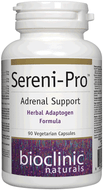Biotics Research
Biotics Research Phosphatidylserine 90 Capsules
- SKU:
- 11414
- UPC:
- 780053007361
- MPN:
- BR1430
Description
Biotics Research Phosphatidylserine 90 Capsules:
Supports Mood , Memory , and Liver function.
It supports cognitive conditions such as concentration, short-term memory loss, mood disorders, as well as for senility, myelin sheath repair, enhanced brain glucose metabolism, increased release of mood enhancing neurotransmitters, helps to improve conditions of adrenal cortical hyperfunction (increased cortisol levels), and to increase cell membrane integrity.
Ingredients:
| Medicinal Ingredient per dose: | ||
| Phosphatidylserine | 100 mg | |
Suggested Dose: 1-2 capsules daily with meals or as directed.
Phosphatidylcholine is the principal circulating phospholipid in plasma, where it is an integral component of the lipoproteins, especially HDL. It plays an important role in both the structure and function of mammalian organ membranes,and is the prime phospholipid in the mammalian heart, accounting for ~40% of the total membrane phospholipids.It is estimated that greater than 98% of the blood and tissue choline is sequestered in phosphatidylcholine.
Phosphatidylcholine, a glycerophospholipid, is the key building block of membrane bilayers, and makes up a very high proportion of the outer leaflet of the plasma membrane. Following ingestion, most of the phosphatidylcholine is broken down and subsequently incorporated into cellular membranes.
Phosphatidylcholine serves as an excellent source of methyl groups for various chemical reactions, as it can supply up to three methyl groups per molecule, thus plays an important role in metabolic regulation. Additionally, it is present in a variety of molecular species in human tissues, primarily due to the variability of the fatty acid tails.
Choline plays a fundamental role in the synthesis of membrane phospholipid components of the cell membrane. Although choline may be synthesized in vivo, from either methionine or serine, it is considered an essential nutrient.The composition of essential fatty acids in phosphatidylcholine determines its value in promoting health.
Lowered blood choline is frequently displayed as liver steatosis (fatty liver) and related dysfunctions, and a deficiency in choline has been correlated with deleterious affects on the expression of a variety of genes, including those involved in cell proliferation, cell differentiation and apoptosis.
Choline deficiency has also been associated with liver dysfunction and neoplastic diseases, as well as with neurodegenerative disorders, including Alzheimer’s and Parkinson’s disease. A source of choline contributes to the biosynthesis of the neurotransmitter acetylcholine, a neurotransmitter which has many functions in the body, including its involvement in muscle control and memory.
Phosphatidylcholine has been implicated as the preferred source of choline for this action. Hepatic phosphatidylcholine is considered an important component in liver function as well as in metabolic regulation.
A decrease in hepatic phosphatidylcholine has been associated with an accumulation of triglycerides in the liver, along with a reduced level of plasma lipids and plasma lipoprotein. In animal studies choline intake was correlated to a hepatoprotective effect. Consequently phosphatidylcholine supplementation in persons with liver impediments is particularly important.
Biotics Research Corporation’s Phosphatidylcholine is supplied as a highly bioavailable form, which is well tolerated, odor free, readily absorbed and most importantly tested tensure quality and purity.







